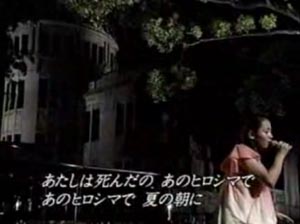I come and stand at every door
But no one hears my silent tread
I knock and yet remain unseen
For I am dead, for I am dead.
I’m only seven although I died
In Hiroshima long ago
I’m seven now as I was then
When children die they do not grow.
My hair was scorched by swirling flame
My eyes grew dim, my eyes grew blind
Death came and turned my bones to dust
And that was scattered by the wind.
I need no fruit, I need no rice
I need no sweet, nor even bread
I ask for nothing for myself
For I am dead, for I am dead.
All that I ask is that for peace
You fight today, you fight today
So that the children of this world
May live and grow and laugh and play.
 Click on the image to watch the video of “Shinda Onnanoko [Dead Girl],” Nobuyuki Nakamoto’s translation of “I Come and Stand at Every Door” (music by Yuzo Toyama and arrangement by Ryuichi Sakamoto), performed by Chitose Hajime and Ryuichi Sakamoto at the Hiroshima Peace Memorial on 5 August 2005. Click on the image to watch the video of “Shinda Onnanoko [Dead Girl],” Nobuyuki Nakamoto’s translation of “I Come and Stand at Every Door” (music by Yuzo Toyama and arrangement by Ryuichi Sakamoto), performed by Chitose Hajime and Ryuichi Sakamoto at the Hiroshima Peace Memorial on 5 August 2005. |
Nâzim Hikmet Ran, the most celebrated Turkish poet, was a Communist. He was the only major writer to speak out against the Armenian massacres in 1915 and 1922. In 1938, Hikmet was condemned to prison for 28 years and four months for anti-fascist activities. Hikmet spent the following 12 years in prisons. After losing his Turkish citizenship, he lived in exile in the Soviet Union and other socialist countries. He died in Moscow, on 3 June 1963.
